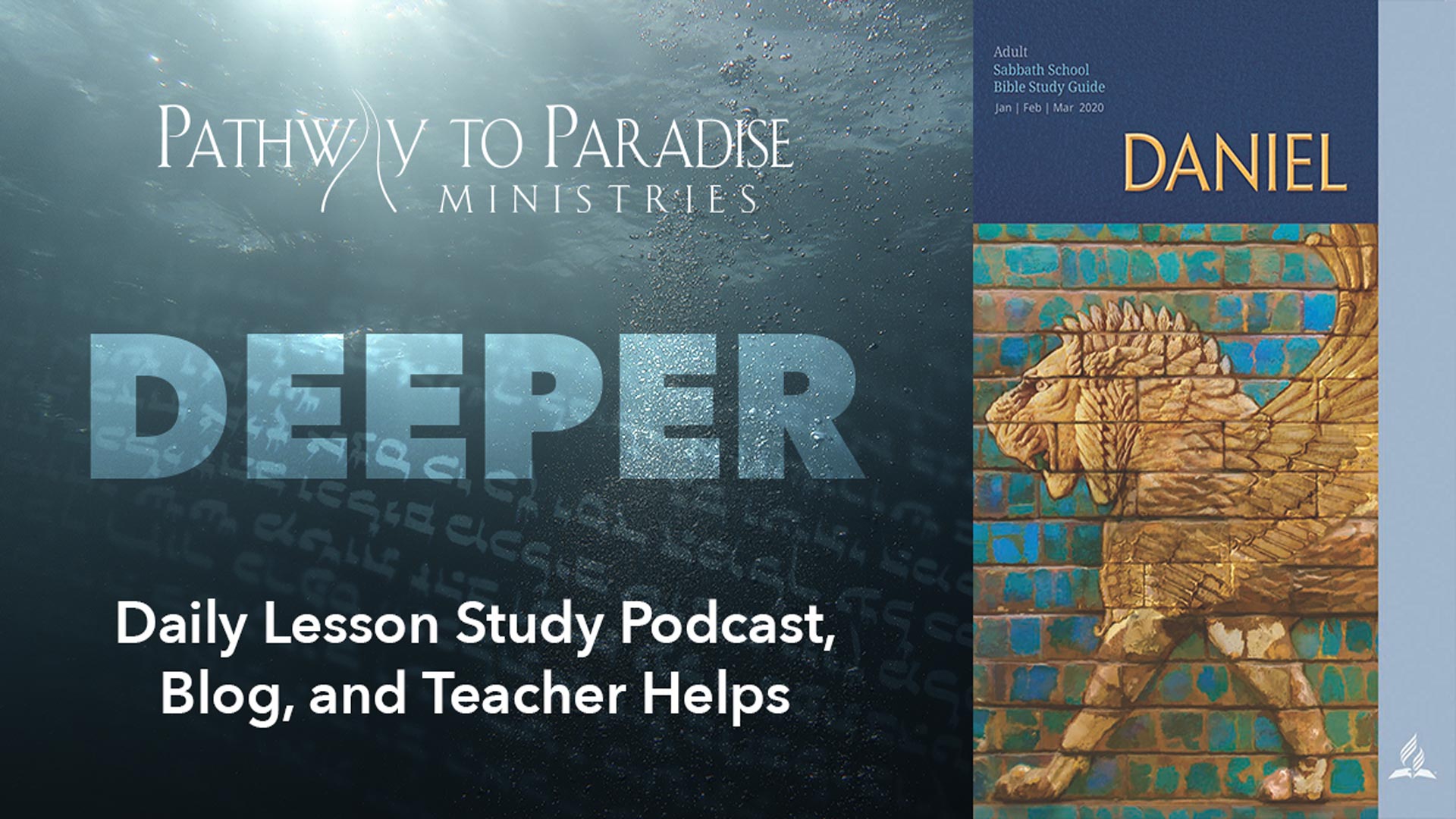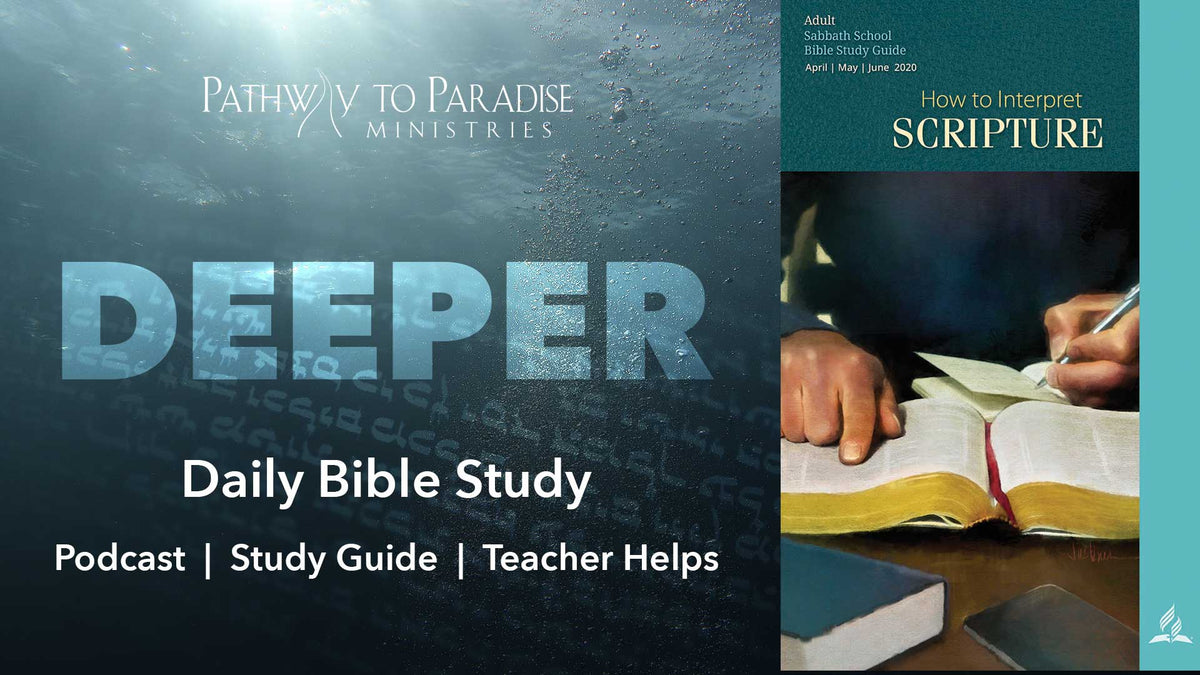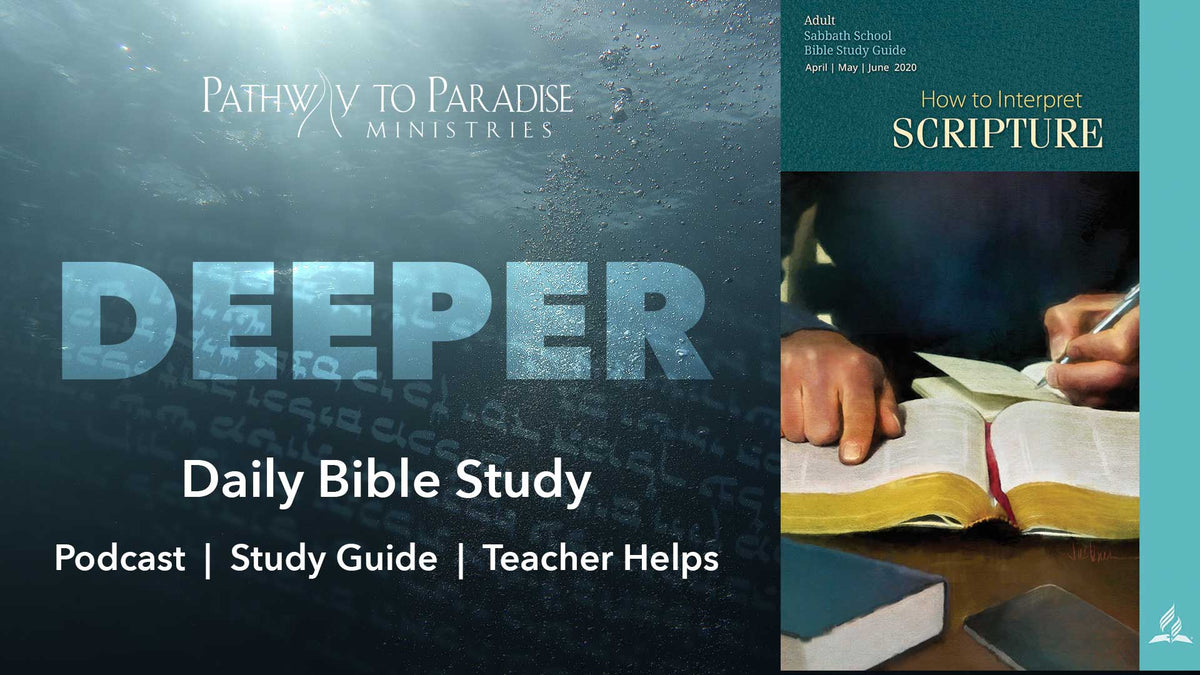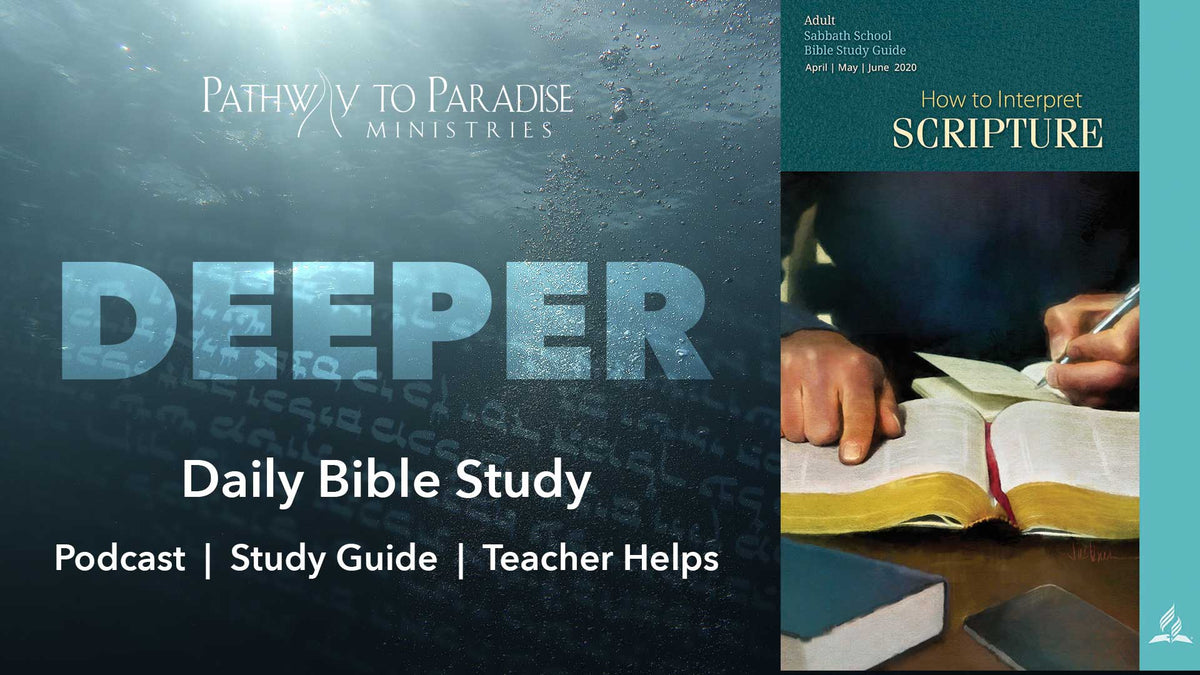From Mystery to Revelation (2020, Quarter 1, Lesson 3)

Sabbath (January 11): From Mystery to Revelation
Daniel 2 provides one of the Bible’s most important prophecies—a view of world history from the time of Nebuchadnezzar’s Babylon until Christ’s second coming and the eventual establishment of God’s kingdom on earth. Daniel’s interpretation of the dream revealed to Nebuchadnezzar, and to us, that God is ultimately in control of this world’s history:
In the annals of human history, the growth of nations, the rise and fall of empires, appear as if dependent on the will and prowess of man; the shaping of events seems, to a great degree, to be determined by his power, ambition, or caprice. But in the word of God the curtain is drawn aside, and we behold, above, behind, and through all the play and counterplay of human interest and power and passions, the agencies of the All-merciful One, silently, patiently working out the counsels of His own will.... {CC 250.3}
Several principle points emerge from Daniel 2, and these points will guide our study this week:
-
God is a God Who reveals Himself to humanity
-
The purpose of divine revelation and prophecy is to help us understand ultimate reality as it centers in God
-
Our choice is to either accept and live within that ultimate reality, or to deny and ignore it.
Discussion Questions:
-
Read 1 Timothy 3:16. What does it mean to you that God reveals Himself to humanity? What does this reveal about God’s character? (Answers will vary.)
-
Read Luke 24:25-27. What was the key that transformed these disciples’ experience from one of mystery, to one of revelation? (They understood Jesus Christ as the center of God’s Word, prophecy, and the current events in their lives.) In what ways is Jesus Christ still the key to help us properly understand God’s purpose for His church today, and the current events taking place in the world around us? (Answers will vary.)
-
Read John 14:29. What purpose of prophecy does Jesus bring out in this verse? (God gives us prophecy so that we may believe in His power and wisdom, and put our faith in Him.)
-
Read the following statement, and discuss the questions that follow:
The history of nations speaks to us today. To every nation and to every individual God has assigned a place in His great plan. Today men and nations are being tested by the plummet in the hand of Him who makes no mistake. All are by their own choice deciding their destiny, and God is overruling all for the accomplishment of His purposes. {PK 536.2}
-
In what way(s) is history a continuous revelation of God?
-
In what way(s) have the events of your life been a continuous revelation of God?
Sunday (January 12): The Immanence of God
The word immanence comes from the Latin immanere, which means “to dwell in.” It is a theological term used to express the idea that God dwells within His creation. Although some have taken the concept of God’s immanence to the unbiblical extreme of pantheism—the belief that the created world and the universe are God—the Bible makes it clear that God does indeed reveal Himself in and through creation (Romans 1:20), and that He desires to live within human beings (1 Corinthians 3:16).
The idea of God’s immanence was evidently one that the Babylonian “wise men” struggled with, for they admitted that they, at least, had no true connection with the divine (Daniel 2:11). As the story in Daniel 2 unfolds, however, it becomes evident that God was working to bring Nebuchadnezzar and his “wise men” face to face with several aspects of “ultimate reality”:
-
God can and does communicate with men
-
The gods of Babylon are false gods
-
The “wise men” of Babylon have no true connection with the false gods or the real God
-
God is in pursuit of Nebuchadnezzar, just as He is for every person today
Discussion Questions:
-
Read Daniel 2:11. What might the “wise men” have meant by this statement? (They apparently believed that the gods have no real interest in humanity, they are distant from the human situation, and there is no real connection possible between humanity and divinity.) What does this view imply about the possibility for humans to understand and participate in ultimate reality? (If ultimate reality is based in God, then this view would imply that it is impossible for humans to connect with God, or to understand or participate in ultimate reality.) How do you think Nebuchadnezzar felt about this admission by his “wise men”? (Betrayed and angry. In Daniel 2:12, Nebuchadnezzar’s death decree follows immediately after their admission.)
-
Read John 5:39 and 1 Peter 1:20,21. What do these verses reveal about how God communicates with humanity? (God speaks clearly and shares objective information with humanity through the Bible.) What does this say to you about God’s character? (Answers will vary.)
-
Read Revelation 13:12-14. This verse predicts that at the end of time, people will be making decisions about ultimate reality based on experientially-based phenomena such as perceptions of the senses and mysticism. Do we see this happening in the world today? (Yes! Postmodernism is in many ways built upon this subjective view of reality.) Even though we have objective information in the Bible, why do so many people today gravitate toward an experience-based religion? (Answers will vary.) How can we avoid making this mistake in our own lives, and corporately as a church? (Answers will vary.)
Monday (January 13): The Prayer
Facing the threat of execution along with the other wise men, Daniel and his friends prayed earnestly that God would reveal the king’s dream and its interpretation (Daniel 2:17-23). When God answered their prayers, Daniel responded with a beautiful prayer of praise and thanksgiving.
Discussion Questions:
-
Read Daniel 2:20. Daniel begins his prayer by praising God for His wisdom and power. For what reasons is this a good way to begin any prayer? (Answers will vary.)
-
Read Daniel 2:21. For what reason would it have been comforting to Daniel and his friends to remember that God sets up and removes kings? (They were captive in a foreign land, serving a pagan king. It would have brought them great comfort to remember that God was in control, even in Babylon.) What does Daniel mean when he says that God gives “wisdom unto the wise”? (Perhaps he is making the same point that Jesus made in Mark 4:11, that the things of God are revealed to those who want to know them and will appreciate them, but they are hidden from those that have no interest.)
-
Read Daniel 2:22. What experiences have you had in your life that helped you realize that God “knoweth what is in the darkness”? (Answers will vary.) What kind of an impact have these experiences had on your relationship with God? (Answers will vary.)
-
Read Daniel 2:23. God’s revelation of the king’s dream to Daniel resulted in the preservation of his life and that of his three friends. What things has God revealed to us today that provide specific, timely, and objective information that we should take action on? (Answers may include the importance of the seventh-day Sabbath, the reality of Christ’s ministry in the Most Holy Place, and end-time prophecies that alert us to the nearness of Christ’s return.)
Tuesday (January 14): The Image: Part 1
As Daniel stood in front of King Nebuchadnezzar, he said, “The secret which the king hath demanded cannot the wise men, the astrologers, the magicians, the soothsayers, shew unto the king; But there is a God in heaven that revealeth secrets” (Daniel 2:27,28). Daniel began his interpretation of the dream by reminding Nebuchadnezzar that what he was about to hear was not man’s opinion, but a direct revelation from God. As the following statement in Testimonies for the Church reveals, God’s power and wisdom provide the only true solution to the problems facing this world:
There are not many, even among educators and statesmen, who comprehend the causes that underlie the present state of society. Those who hold the reins of government are not able to solve the problem of moral corruption, poverty, pauperism, and increasing crime. They are struggling in vain to place business operations on a more secure basis. If men would give more heed to the teaching of God’s word, they would find a solution of the problems that perplex them. {9T 13.3}
Discussion Questions:
-
Historical documents reveal that in ancient Babylonian culture, many people believed that the gods communicated through dreams, statues were a common element, and four-metal symbolism was also used. Why do you think God chose to communicate with Nebuchadnezzar using things that he was already familiar with? (First, God wanted Nebuchadnezzar to understand the dream once Daniel explained it. Second, God also wanted the king to remember the underlying message of the dream, and this was more likely to happen if it used symbols that the king was already familiar with. Third, God meets us where we are at, and then works to change us and transform us into something better.) What does God’s strategy reveal about God’s character? (Answers will vary.)
-
Read Daniel 2:28. On what period of time does this dream focus? (The “latter days,” or the time of the end.) For what reasons would God reveal things so many thousands of years in advance? (To reveal His wisdom and power, and to guide and assure His people throughout history that He is in control.) What does this reveal about God’s character? (Answers will vary.)
-
Read Daniel 2:36-39. Why would God reveal to a pagan king that his kingdom will eventually fall? What do you think the focus in Nebuchadnezzar’s life was at this point? (Building his kingdom and making it powerful, strong, and enduring. Just like Jesus revealed to the rich young ruler the aspect of his life that was keeping him separated from God (Mark 10:17-23), He was revealing to Nebuchadnezzar the focus of his life that would keep him separated from God.) What does this reveal about God’s character? (Answers will vary.)
Wednesday (January 15): The Image: Part 2
Daniel proceeded to explain and interpret the king’s dream. Nebuchadnezzar had seen a great image with a head of gold, chest and arms of silver, belly and thighs of brass, and legs of iron and clay (Daniel 2:31-33). These four metals represented successive world empires, beginning with Babylon (vs. 37,38) and ending with Rome. The feet of iron and clay, and the stone that crushes them and the rest of the image, point to the time of the end, Christ’s second coming, and the eventual establishment of God’s kingdom on earth (vs. 43,44).
Discussion Questions:
-
Read Daniel 2:31. How did Daniel describe the appearance of the image? (It was “great,” its “brightness was excellent,” and its form was “terrible.”) In what ways is this image a fitting description of the evolutionary, humanistic worldview so prevalent in our world today? (Many people see humanity as advancing toward perfection and able to solve its own problems without help from any outside power.) How do you think this image reflected Nebuchadnezzar’s view of himself? (Pretty accurately. Maybe the face even looked like Nebuchadnezzar!)
-
Read Ephesians 4:11-13. How does the “perfect man” described in this passage contrast with the impressive image in Nebuchadnezzar’s dream? (The “perfect man” represents humanity as it may be when united with Jesus Christ. Nebuchadnezzar’s image represents humanity independent of, and in opposition to, God.) What things define those people who are part of this “perfect man” in Ephesians 4:13? (Among other things, they are unified in faith and have the knowledge of God.)
-
Read Daniel 2:35 and Ephesians 4:14. What impact does “wind” have on the image of Daniel 2 and the “perfect man” of Ephesians 4? (The wind carries away the remnants of Nebuchadnezzar’s image, while it has no effect on the “perfect man” in Ephesians.) What lesson do you think we should take from this comparison? (Answers will vary. Everything not rooted in Christ will be swept away, while those that place their faith in Him will live forever.)
-
Read Daniel 2:40-43. What does it signify that the image rests on clay feet? (Unless our lives are submitted to God’s leading and control, everything we can do and accomplish in life is built on clay, or sand, as Jesus said in Matthew 7:26,27.)
Thursday (January 16): The Stone
Keeping in mind that Nebuchadnezzar’s dream in Daniel 2 concerned the “latter days,” he must certainly have been intrigued by the meaning of the stone “cut out without hands” that strikes the image and breaks it into pieces (Daniel 2:34,35). While the king was perhaps familiar with the four-metal symbolism earlier in the dream, the symbol of the stone would have been something completely new. The stone and its destruction of the earlier metal kingdoms contains important lessons regarding the ultimate fate of our world:
-
The Bible reveals the general timing of the second coming, after the division of the iron kingdom (Rome) into several pieces, represented by the feet of iron and clay.
-
God’s kingdom on this earth will be a literal kingdom, just as real as the former world empires depicted by the four metals.
-
God’s kingdom will be the final kingdom to ever reign on earth; none other will ever destroy it.
-
The nature of God’s kingdom (represented as it is by a stone cut out “without hands”) will be far different from that of the human-led empires.
Discussion Questions:
-
Read John 14:29. Given the remarkable accuracy of this Bible prophecy in predicting the rise and fall of nations, what logical conclusion should we reach about the stone kingdom? (It, too, will come to pass.)
-
Read the following passages and discuss what they tell us about the foundation of God’s “stone kingdom,” and how we can be part of it:
-
Exodus 31:18. (The law of God is the foundation of His government. Those who live in His kingdom will keep His law.)
-
1 Corinthians 10:4. (God’s kingdom is founded on the life, death, resurrection, and ministry of Jesus Christ. Those who live in His kingdom will accept Christ as their Savior and their King.)
-
Matthew 7:24,25. (God’s kingdom is made up of those who build their lives upon Jesus Christ and God’s law.)
-
Friday (January 17): The Rock of Refuge
Daniel 12:1 describes a “time of trouble, such as never was since there was a nation even to that same time.” At this time, Michael, or Jesus Christ, will “stand up” for His people and deliver them. Then, as always, the Rock will be a place of safety.
Discussion Questions:
-
Read Psalm 27:4. Where does David say he wants to dwell? (In the temple.) How often, or how consistently, does he want to dwell there? (All the days of his life.) What spiritual lessons can we take from David’s wish? (Answers will vary. Our desire should be to pursue our relationship with God, and to build our faith in Him, every day.)
-
Read Psalm 27:5 and Psalm 91:1-4. Where, specifically, does David regard the place of safety to be? (In the Most Holy Place, above the mercy seat, under the wings of the cherubim.) What “rock” is in the Most Holy Place that David wishes to be set up on? (The “rock” points to both the law of God contained in the ark, and to Jesus Christ our High Priest, the Rock of our salvation.)
-
Read Psalm 27:5. At what time, or during what crisis, will it be so important to be hidden in the Most Holy Place? (During the “time of trouble.”)
-
Read Revelation 14:12. On what will God’s people be standing at the end of time? (At the end of time God’s people will be standing on both the law of God and Jesus Christ. The Three Angels’ Messages explain how to have this kind of experience.)
Listen to the Daily Podcast!
Go to the DEEPER Webpage or Listen Below
1 Response
shplazkzwd
Muchas gracias. ?Como puedo iniciar sesion?
Leave a comment
Comments will be approved before showing up.
Also in DEEPER Bible Study Notes

Living by the Word of God (2020, Quarter 2, Lesson 13)

Dealing With Difficult Passages (2020, Quarter 2, Lesson 12)


Tim Rumsey
Author